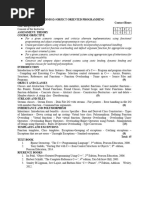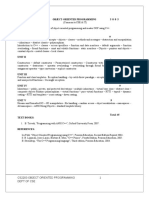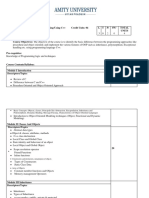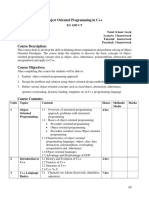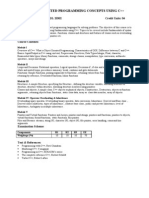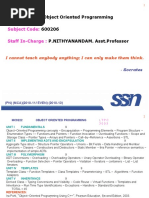Object Oriented Programming
Uploaded by
manickambk4Object Oriented Programming
Uploaded by
manickambk4CS2203 OBJECT ORIENTED PROGRAMMING 3 0 0 3
(Common to CSE & IT)
Aim:
To understand the concepts of object-oriented programming and master OOP using C+
+.
Unit I 9
Object oriented programming concepts – objects – classes – methods and messages –
abstraction and encapsulation – inheritance – abstract classes – polymorphism.
Introduction to C++ – classes – access specifiers – function and data members – default
arguments – function overloading – friend functions – const and volatile functions - static
members – Objects – pointers and objects – constant objects – nested classes – local
classes
Unit II 9
Constructors – default constructor – Parameterized constructors – Constructor with
dynamic allocation – copy constructor – destructors – operator overloading –
overloading through friend functions – overloading the assignment operator – type
conversion – explicit constructor
Unit III 9
Function and class templates - Exception handling – try-catch-throw paradigm –
exception specification – terminate and Unexpected functions – Uncaught exception.
Unit IV 9
Inheritance – public, private, and protected derivations – multiple inheritance - virtual
base class – abstract class – composite objects Runtime polymorphism – virtual
functions – pure virtual functions – RTTI – typeid – dynamic casting – RTTI and
templates – cross casting – down casting .
Unit V 9
Streams and formatted I/O – I/O manipulators - file handling – random access – object
serialization – namespaces - std namespace – ANSI String Objects – standard template
library.
Total: 45
TEXT BOOKS:
1. B. Trivedi, “Programming with ANSI C++”, Oxford University Press, 2007.
REFERENCES:
1. Ira Pohl, “Object Oriented Programming using C++”, Pearson Education, Second
Edition Reprint 2004..
2. S. B. Lippman, Josee Lajoie, Barbara E. Moo, “C++ Primer”, Fourth Edition,
Pearson Education, 2005.
3. B. Stroustrup, “The C++ Programming language”, Third edition, Pearson
Education, 2004.
You might also like
- Unit 1: Cs2203-Object Oriented Programming-Anna University Syllabus For CSENo ratings yetUnit 1: Cs2203-Object Oriented Programming-Anna University Syllabus For CSE3 pages
- CS2203 Object Oriented Programming NotesNo ratings yetCS2203 Object Oriented Programming Notes109 pages
- 09Cs203 Programming in C++ Credits: 3:0:0 Course ObjectiveNo ratings yet09Cs203 Programming in C++ Credits: 3:0:0 Course Objective1 page
- Savitribai Phule Pune UniversityoopsyllabusNo ratings yetSavitribai Phule Pune Universityoopsyllabus4 pages
- Object-Oriented Programming Concepts & Programming (OOCP) 2620002No ratings yetObject-Oriented Programming Concepts & Programming (OOCP) 26200023 pages
- Cap202 - Object Oriented Programming SyllabusNo ratings yetCap202 - Object Oriented Programming Syllabus2 pages
- Gujarat Technological University Semester: II Subject Name: Object Oriented Programming in C++ Subject Code: 1320304 Teaching and Examination SchemeNo ratings yetGujarat Technological University Semester: II Subject Name: Object Oriented Programming in C++ Subject Code: 1320304 Teaching and Examination Scheme2 pages
- MCA-108 Object Oriented Programming Using C++ L-T-P: 3-1-0No ratings yetMCA-108 Object Oriented Programming Using C++ L-T-P: 3-1-091 pages
- C++ Syllabus Object Oriented Programming PDF100% (1)C++ Syllabus Object Oriented Programming PDF179 pages
- M.C.a (Sem - III) Paper - I - Object Oriented ProgrammingNo ratings yetM.C.a (Sem - III) Paper - I - Object Oriented Programming179 pages
- Object Oriented Programming Concepts Using CNo ratings yetObject Oriented Programming Concepts Using C2 pages
- Object Oriented Paradigm: C++ Programming Language by Bjarne Stroustrup, 4 EditionNo ratings yetObject Oriented Paradigm: C++ Programming Language by Bjarne Stroustrup, 4 Edition2 pages
- CS 2203 Object-Oriented Programming 3 0 0 3No ratings yetCS 2203 Object-Oriented Programming 3 0 0 333 pages
- Object Oriented Programming With C_Syllabus (1)No ratings yetObject Oriented Programming With C_Syllabus (1)3 pages
- Far Western University Mahendranagar, Kanchanpur: Faculty of EngineeringNo ratings yetFar Western University Mahendranagar, Kanchanpur: Faculty of Engineering4 pages
- Object Oriented Programming 600206 P.NITHYANANDAM. Asst - ProfessorNo ratings yetObject Oriented Programming 600206 P.NITHYANANDAM. Asst - Professor476 pages
- Gujarat Technological University: B.E. Semester: IV Computer EngineeringNo ratings yetGujarat Technological University: B.E. Semester: IV Computer Engineering1 page
- Mastering Python: A Comprehensive Guide to ProgrammingFrom EverandMastering Python: A Comprehensive Guide to ProgrammingNo ratings yet











